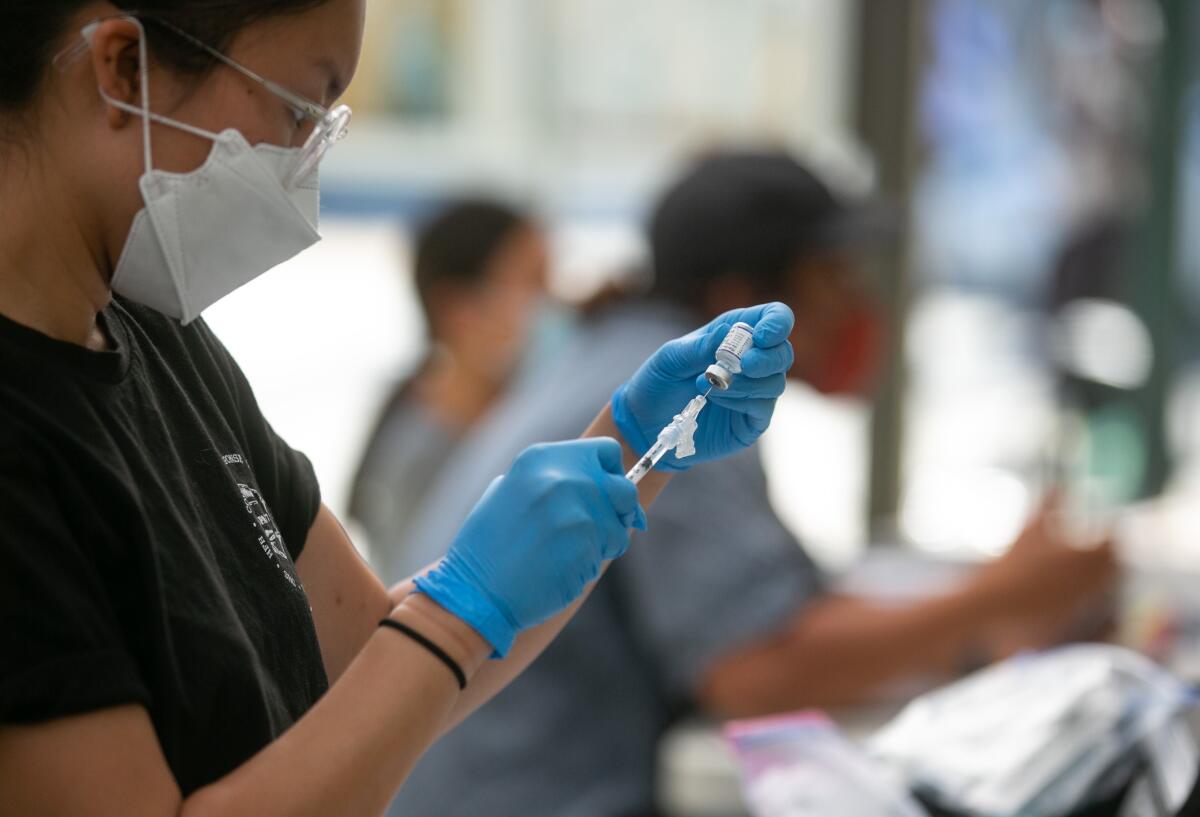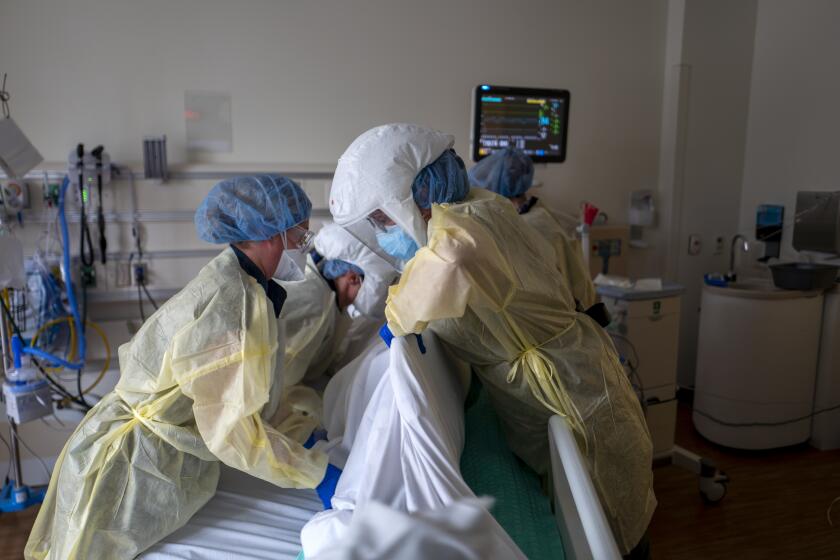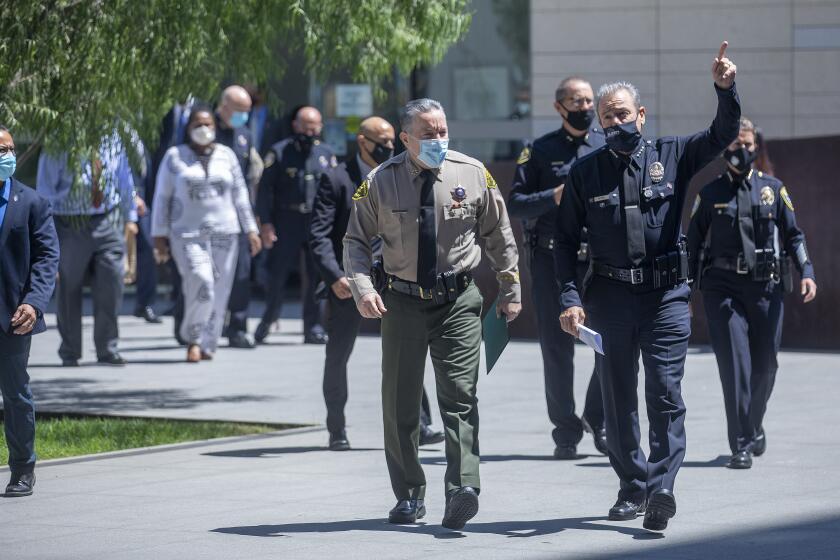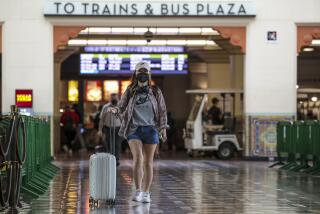L.A. puts off vote on vaccination requirement for indoor venues

- Share via
Many members of the Los Angeles City Council voiced support Wednesday for a sweeping proposal that would require people to show proof of vaccination against COVID-19 to go inside restaurants, shopping centers, movie theaters, hair and nail salons, and a range of other indoor venues in Los Angeles.
But after more than an hour of discussion, the council did not vote on the proposed ordinance after Councilman Joe Buscaino, a candidate for mayor, raised concerns about the measure and said he would withhold his vote.
“Unenforceable laws are ridiculous,” Buscaino said.
The measure will be voted on next week, city officials said. The proposed law could be passed that day with a majority vote. Council members had expected that the final decision might happen next week anyway: If the council had voted Wednesday on the proposal and the decision wasn’t unanimous, the measure would have required another vote next week.
Buscaino campaign advisor Michael Trujillo said the move doesn’t change the timeline for when the rules could go into effect but “gives council members a chance to get more educated on it.”
“He had more questions about this than the Riddler,” Trujillo said.
Council President Nury Martinez said the measure will be approved.
“This council was ready to lead and one member was not,” Martinez said after the meeting. “This is about saving lives, and political stunts like this are now putting Angelenos at risk.”
Under the proposed ordinance, customers entering certain indoor businesses in L.A. would have to offer proof of vaccination beginning on Nov. 4. Martinez argued the rules are needed to protect children too young to be eligible for the shots, as well as people who were vulnerable because of other medical conditions.
Ahead of the meeting, Martinez told reporters that “it is unfair to continue to put everyone else’s lives on pause because some won’t listen to science, data and the facts.”
The new law would cover an assortment of businesses with indoor facilities, including coffee shops, gyms, museums, bowling alleys and spas. Under the proposed rules, customers can offer written exemptions to the rules for stated religious or medical reasons, but businesses must require them to use outdoor facilities if they are available.
If there is no outdoor option at the venue, exempt customers must provide proof that they have recently tested negative for the coronavirus in order to come inside. Customers who don’t provide proof of vaccination or exemption would still be able to enter a business briefly to use a restroom or pick up a takeout order.
L.A. would also require vaccination proof to enter indoor city facilities as of Nov. 4, although unvaccinated people would be provided “alternative arrangements for access to government services,” determined on a case-by-case basis, according to the ordinance. That could include online or outdoor services or providing a negative test to enter an indoor facility.
Florida was hailed as a model for battling the coronavirus, with many favorably comparing it with California. Then the Delta variant hit and Florida fell behind California in many key metrics, especially deaths.
During Wednesday’s meeting, Buscaino raised concerns about the possible effects on businesses. He said he backed the goal of getting more people vaccinated but argued that workers would end up being “the main enforcers of this ordinance.”
“Making a teenager ... serve as a bouncer to keep people in or out of a restaurant and then fining the business for their failure is not the way to go about it,” Buscaino said.
Others on the council said the city needed to press forward with the law in light of the ongoing pandemic, even as they voiced some concerns. Councilman Bob Blumenfield said there might be issues to work out around how the rules would play out at shopping malls, for instance, but the council had time to pass “cleanup language” to address them.
“The crisis is too real to do anything that is going to slow this down,” Blumenfield said.
Councilman Gil Cedillo argued that “we can’t let perfection be the enemy of the good — or perfection be the enemy of the necessary” during that crisis. And Councilman Paul Krekorian said the ordinance did not mandate that anyone get vaccinated, but simply limited their ability to put others at risk.
“You have rights. You have liberties. But with those rights and liberties come obligations to protect fellow members of your society as well,” Krekorian said before urging the council to pass the new law.
Business groups, including the Los Angeles County Business Federation and the Los Angeles Area Chamber of Commerce, said they were concerned that the city rules could create confusion and potential challenges for businesses because L.A. County had issued its own, more limited order that is set to be implemented starting early next month.
Some said they were concerned that L.A. businesses could wind up losing patrons to neighboring areas with lesser restrictions. “Having a local approach as opposed to a uniform countywide approach means that the businesses that are near the edges may lose business to other areas,” said Stuart Waldman, president of the Valley Industry and Commerce Assn. “It’s easy to go from San Pedro over to Palos Verdes.”
And some opponents argued that the rules were divisive and unnecessary and would infringe on their rights. Members of the Libertarian Party pledged to pursue a referendum to overturn the new rules.
“You have NO right to dictate how a person lives their life, what they put in their body or who a business decides to let inside their building. Period,” one opponent wrote to the council. “Why don’t you put your energy into cleaning up the city and stop trying to tell us where we can and can’t go or who is allowed in our businesses.”
Others spoke up in favor of the plan, arguing it was rooted in clear science and would help the city get back to normal. One caller who said he had recently visited New York City, which has imposed such requirements, said simply that “it worked.”
Nearly 68% of L.A. County residents are already at least partially vaccinated for COVID-19 and more than 60% have completed their inoculation series, according to data compiled by The Times.
A survey conducted from Aug. 20 to 29 by the Public Policy Institute of California found that 67% of L.A. County residents, and 61% of California residents, favored requiring proof of COVID-19 vaccination to enter certain indoor spaces and large outdoor gatherings.
Regionally, majorities in Orange and San Diego counties, the San Francisco Bay Area and the Central Valley also backed vaccination-verification requirements to enter those public spaces. A majority of survey respondents from the Inland Empire opposed them.
The L.A. city rules would cover people who are eligible for COVID-19 vaccinations, including shots covered under an emergency use authorization from the U.S. Food & Drug Administration.
Los Angeles County health officials have identified hundreds of coronavirus outbreaks at police and fire agencies since the start of the pandemic, according to county data.
Businesses that defy the rules would face escalating penalties under the proposed law, starting with a warning notice for a first violation, then a $1,000 fine for a second violation, eventually reaching a $5,000 penalty for a fourth or subsequent violation. The fines would begin to be enforced starting Nov. 29.
Martinez said the city had not included grocery stories, pharmacies and several other kinds of businesses under the proposed requirements because they were providing “essential services.”
“We can’t limit people from buying their groceries or going to a doctor’s office or getting gas or fueling their vehicle, and so we want to be very careful and sensitive to that,” Martinez told reporters.
The L.A. ordinance would expire when the city lifts its emergency declaration for the COVID-19 pandemic.
The city is pursuing its own requirements after Los Angeles County rolled out a health order that will require patrons and workers at indoor bars, wineries, breweries, nightclubs and lounges to be at least partially vaccinated by Oct. 7 and fully vaccinated by Nov. 4. The county order recommends — but does not require — vaccine proof inside restaurants.
The L.A. city law would also mandate proof of vaccination or a negative COVID test to enter outdoor events with 5,000 or more attendees; L.A. County is requiring such proof at outdoor events with 10,000 or more people starting Oct. 7.
The county order already applies in L.A. city limits, but California cities can expand on county orders for vaccine requirements. West Hollywood has also imposed its own rules expanding on the county order.
Other California cities beyond L.A. County have also set forth established their own vaccination requirements. The L.A. rule would cover more businesses than in San Francisco or Berkeley, whose orders don’t apply to malls, salons or museums, but is more permissive than their rules in allowing people to offer up a negative test as a substitute for vaccination. Beyond California, New York City has mandated vaccination proof at restaurants, bars, movie theaters and other indoor sites.
Times staff writer Rong-Gong Lin II contributed to this report.
More to Read
Sign up for Essential California
The most important California stories and recommendations in your inbox every morning.
You may occasionally receive promotional content from the Los Angeles Times.

















